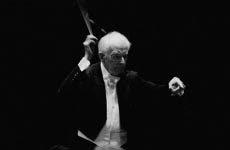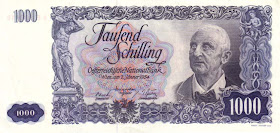Here's a swimmer's guide to the cosmic oceans of sound: Bruckner's symphonies.
 |
| Gunther Wand |
This excellent set of the nine numbered symphonies (Wand leaves out the '00' and '0' works) is available in an old-fashioned "doorstop box" from RCA Red Seal. Wand had a long podium career, and became a Bruckner specialist later in his career. His Cologne-based orchestra is quite good, with above-average horns and woodwind. But the selling point here is the conductor's devotion to the absolute letter of Bruckner's scores. This set is a good starting point.
The George Tintner Naxos Cycle
Although he was battling cancer at the time, the late George Tintner made a landmark cycle of Bruckner symphonies. He coaxed great performances from a series of obscure orchestras. This super-budget set includes the, proving that you didn't have to have a big name to play great Bruckner. The set includes Symphony No. 0 (Die Nullte) and the even rarer Symphony No. 00, which Bruckner rejected as being a mere student work.
Royal Concertgebouw Orchestra
cond. by Bernard Haitink
Two excellent cycles from the great Dutch orchestra, each featuring a fine conductor. Haitink recorded complete cycles of most of the major symphonists. Under his baton, one hears the classic Concertgebouw sound, a certain mellow orchestral quality that is difficult to duplicate anywhere else. Chailly's set is in more modern digital sound, and showcases this great orchestra under more fiery leadership. His cycle also includes the best performance of "Die Nullte" on this list.
 |
| Sergiu Celibidache |
cond. by Eugen Jochum
The Berliners cement their reputation as one of the world's top orchestras with these three fine cycles. Jochum is brisk and no-nonsense. His cycle is like Wand's, close to the letter of the text and a sturdy presence in the CD catalogue for years. Karajan is very comfortable in this music and takes a relaxed Romantic approach. These Berlin recordings are better than his later "Karajan Gold" recordings with the Vienna Philharmonic.
The more recent Barenboim recordings (his second complete cycle of the symphonies--the first has been deleted) are the most idiosyncratic, with odd decisions in matters of tempo and dynamic. Still, the Berlin forces play their hearts out, and it is interesting to hear Barenboim puts his unique stamp on each symphony.
The Recordings of Sergiu Celibidache
Special mention must be made of this maverick Romanian conductor. Like Wand, Celibidache was a Bruckner specialist. However, unlike most conductors, Celibidache did not believe in making recordings. Luckily his family preserved tapes of radio broadcasts of some of his performances. These were released after his death in a series of issues on EMI and Deutsches Grammophon. These are not complete cycles, (Symphonies Nos. 1 and 2 are missing, and the DG set omits No. 6 as well) but the performances are moving and in most cases, super-slow. Not the best first performances to own, but these are favorites of Bruckner devotees.

